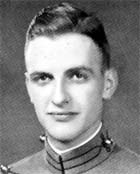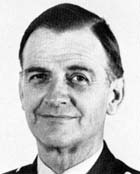
Jonathan Waverly Anderson, Jr.
No. 13430 • 14 March 1920 – 19 November 1988
Died in Atlanta, Georgia, aged 68 years
Interment: Arlington National Cemetery, Arlington, Virginia
In the period just before and just after World War I, several Naval Academy graduates were permitted to take commissions in the Army artillery. At least two members of our class were children of those fine artillerymen; one was Tibby Anderson. Tibby was born in that Valhalla of artillerymen, Fort Sill, Oklahoma, with an older sister, and later a younger one. His youth was spent like many Army brats, going from post to post on assignments of three or four years. In those days there was not the fine DOD school system we now have. Tibby’s earliest schooling came from following his sister to her class in a two-room schoolhouse. He lived in Fort Hoyle, Edgewood Arsenal, and Aberdeen Proving Ground — all in Maryland.
Finally, a little regularity came to his high school years, and he graduated from the Highland Falls School in 1937 when his father was stationed at West Point. Having lived on the water for many years, Tibby was very fond of sailing. While his family was at West Point, he was given a sailboat, and spent many a long afternoon sailing on the Hudson. After high school graduation he spent a year at Brown University and then joined many other future class members prepping at “Beanie” Millard’s. In the frantic search for appointment which so many of us remember, relatives in
Tennessee were able to help with a Senatorial slot for the summer of 1939.
At West Point, Tibby settled in comfortably among the goats. When he became a corporal, his military standards became apparent to the underclasses and he was a lieutenant as a first classman. Since he had not been particularly interested in such rough and tumble sports as football, it was with some surprise that we found him among the first volunteers for airborne training, at a time when there was not today’s emphasis on safety. There he did well, and was quickly a company commander in the 513th Parachute Infantry Regiment. But fate intervened. The bad news was that his leg was badly shot up by machine gun fire in the Infiltration Course. The good news was that while in the Benning Hospital he met the lovely nurse he was later to marry. So it was as a straight-leg that he did the European Theater of Operations — company commander in the 232nd Infantry Regiment of the 42nd Division, until taken prisoner by the Germans for about six months. He ended the war with a Combat Infantryman Badge, Bronze Star, and Purple Heart for further wounds.
From Europe it was straight to Alaska until 1948. There he and Rosalind were married. In due course, Rosalind II arrived to complete the family unit. Secondary specialties were not as formal in our day, but Tibby rapidly developed one as a planner, and his troop tours varied with DCSOPS tours at various headquarters: DA, Seventh Army, USAREUR, EUCOM, and DA again. He did two tours in Vietnam, the second as advisor to the General Political Warfare Division of the JGS. Part of his preparation for these later tours came from a return to roots at the Naval War College, where he also picked up a master of science in international affairs.
The peak tour for Tibby and Rosalind came in 1966 when he became brigade commander in the 24th Division for Ed Rowny. To quote Ed, “Jonathan Anderson led a very fine brigade in the 24th Division …. Colonel Anderson led his brigade to the highest scores ever achieved in the European Theater in both training and maintenance. His leadership was characterized by great enthusiasm and uncommon compassion for the difficulties his troops and their families suffered. In his brigade he was the ‘father figure’ and his wife, Rosalind, the ‘mother.’ Their brigade, and we must emphasize it was their brigade, was one big happy family, a joy to behold.”
While in Europe, further physical problems began to set in. Tibby served a full thirty years, but his retirement was for physical disability. Unwilling to leave contact with the military, he and Rosalind settled in Winston-Salem, where he taught high school ROTC. The beach still called him, and after five years he spent some time in St. Augustine, where he took further courses and also taught. Then it was back to Atlanta. It was there that his physical problems finally were more than mortal coil allowed, and he died in 1988.
Tibby was first and foremost an Army man, whether teaching others, leading others, or planning. At the same time, his family was very important to him, and he managed to keep that focus even while doing superbly in his duties. From 1968–73, he was awarded the Legion of Merit three times, further testimony to quality of service. It was the idea of service which called Tib to West Point; it was service he gave his nation both during thirty years of active duty and after retirement. When we say the nation has lost a faithful servant, it is in the finest sense of that word. Our future hangs on that sort of dedication and understanding continuing with those who follow close order behind us.
Tibby is survived by Rosalind, by Rosalind II, who is active in real estate, by two teenaged grandsons, and by his sisters, both of whom married graduates.
NOTE: His father, Jonathan Waverly Anderson, Sr., Major General, United States Army, is also buried in Arlington National Cemetery.
Michael Robert Patterson was born in Arlington and is the son of a former officer of the US Army. So it was no wonder that sooner or later his interests drew him to American history and especially to American military history. Many of his articles can be found on renowned portals like the New York Times, Washingtonpost or Wikipedia.
Reviewed by: Michael Howard

